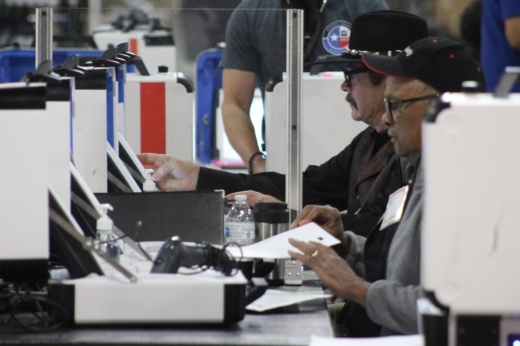Sen. Brian Hughes, R-Mineola, filed Senate Bill 6 in response to at least six lawsuits challenging the results of the Nov. 7 constitutional amendment election. Texas voters overwhelmingly approved 13 constitutional amendments — including property tax relief for homeowners and a cost-of-living adjustment for retired educators — but the new policies cannot go into effect while the lawsuits are active.
“Without those election contests resolved, there’s a concern that the governor would not be able to certify the election results,” Hughes said during a last-minute committee hearing Dec. 1. “And so none of those matters that the people of Texas have spoken on, none of those would take effect.”
The lawsuits claim voting machines in various Texas counties were not certified, Hughes said. All voting equipment must be certified by the Texas Secretary of State and the U.S. Election Assistance Commission before they are used in an election, according to the secretary of state's website.
Senators approved Hughes’ bill with a 23-1 vote Dec. 1. SB 6 now heads to the Texas House, although it is unclear if the lower chamber will consider the proposal before the fourth special legislative session ends Dec. 6.
Breaking down the bill
SB 6 would significantly tighten the deadline for courts to hold trials and rule on challenges to constitutional amendment elections. The bill would require that all trials for constitutional amendment challenges occur within 50 days after the election. A court would then have 5 days after the trial ends to issue a ruling, the bill states.
If rulings are then appealed to a court of appeals or the Texas Supreme Court, each court would have 30 days to issue a judgment or opinion. Similar timelines already exist for challenges to candidate elections.
The bill would apply to the Nov. 7 constitutional amendment election and any future constitutional amendment elections.
Hughes said he did not intend to limit Texans’ right to challenge elections.
“Nothing in Senate Bill 6 affects the rights of the people that filed the election contest,” Hughes said. “What we are doing is saying to the courts — you have to hear this case quickly, rule on it quickly, so it can be appealed to the next level, so that we have a resolution.”
During a special legislative session, lawmakers can typically only pass legislation formally requested by the governor. Gov. Greg Abbott had not added the issue to his special session agenda by the evening of Dec. 1, although Abbott's office told Community Impact that he would consider expanding the agenda if both chambers passed SB 6.
Gov. Abbott can choose to sign or veto any bills lawmakers pass.
What they’re saying
“We are acting quickly because the session ends in the middle of next week and we want to be sure this is handled in an expedited manner,” Lt. Gov. Dan Patrick, who oversees the Senate, said.
Patrick argued that “it is up to the Texas House to decide” how long the election challenges can remain in court.
Hughes said he collaborated with House members on SB 6.
Sen. Sarah Eckhardt, D-Austin, said the lawsuits were based on “recycled allegations that we have seen over the course of a decade” and “claims elevated by the highest members of the Republican Party, including Donald Trump and his supporters.”
Hughes and other Texas Republicans have pushed for tighter voting restrictions based on debunked claims about election fraud.
Katya Ehresman, the voting rights program manager for government watchdog Common Cause Texas, said Texans have challenged constitutional amendment elections in the past.
“[But] this is the first time we have seen... election denialism and these kinds of contests attempting to sow doubt in our elections actually result in consequences for everyday Texans that are feeling the brunt of that contest," Ehresman told Community Impact.
Ehresman said lawmakers should not “rush through legislative changes to any part of the election code.” She argued that the “frivolous lawsuits” could be dismissed under current law.
“I don’t want to see the Legislature put the cart before the horse and change the system in a process that hasn’t even been tried yet," she said.
Stay tuned
It is unclear if the House will vote on SB 6 before the special legislative session ends Dec. 6. House lawmakers left the Capitol Dec. 1 without taking action on bills and are scheduled to reconvene next week.





